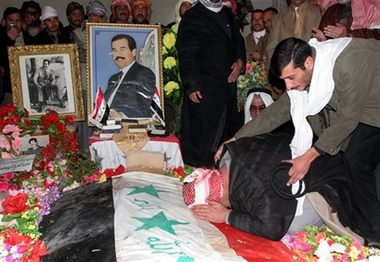Saddam execution video draws criticism
(AP)Updated: 2007-01-03 09:48
 An Iraqi cries on the grave of the country's former president Saddam Hussein in Ouja, 115 kilometers (70 miles) north of Baghdad, Iraq, Tuesday, Jan. 2, 2007. [AP]  |
Grainy cell phone video of Saddam Hussein's execution triggered international criticism Tuesday, with Britain's deputy prime minister calling the leaked images "unacceptable" and the Vatican decrying the footage as a "spectacle" violating human rights.
The unofficial video showed a scene that stopped just short of pandemonium, during which one person is heard shouting "To hell!" at the deposed president and Saddam is heard exchanging insults with his executioners. The inflammatory footage also showed Saddam plummeting through the gallows trapdoor and dangling in death.
The grainy video appeared on the Internet and Al-Jazeera television late Saturday. On Tuesday, Iraqi Prime Minister Nouri al-Maliki ordered an investigation into the execution to try to uncover who taunted the former leader, and who leaked the cell phone footage.
At the United Nations, new UN Secretary-General Ban Ki-moon ran into trouble
on his first day of work over Saddam Hussein's execution when he failed to state
the United Nations' opposition to the death penalty and said capital punishment
should be a decision of individual countries.
The UN has an official
stance opposing capital punishment and Ban's predecessor Kofi Annan reiterated
it frequently. The top UN envoy in Iraq, Ashraf Qazi, restated it again on
Saturday after the former Iraqi dictator was hanged.
Ban, however, took
a different approach, never mentioning the UN ban on the death penalty in all
its international tribunals, and the right to life enshrined in the UN Charter.
"Saddam Hussein was responsible for committing heinous crimes and
unspeakable atrocities against Iraqi people and we should never forget victims
of his crime," Ban said in response to a reporter's question about Saddam's
execution Saturday for crimes against humanity. "The issue of capital punishment
is for each and every member state to decide."
His ambiguous answer put
a question mark over the UN's stance on the death penalty. It also gave the new
chief an early taste of how tricky global issues are, and how every word can
make a difference.
Michele Montas, Ban's new spokeswoman, insisted there
was no change in UN policy in what she described as "his own nuance" on the
death penalty.
"The UN policy still remains that the organization is not
for capital punishment," she said. "However, the way the law is applied in
different countries, he left it open to those different countries."
The
death penalty is legal in Ban's homeland, South Korea as it is in many other
countries including the United States, Russia, China and much of the Middle
East.
Ban, who took over on New Year's Day from Annan, is the first
Asian to serve as secretary-general in 35 years. Tuesday was his first day of
work at UN headquarters.
British Deputy Prime Minister John
Prescott said those who leaked the footage should be condemned.
"I think the manner was quite deplorable really. I don't think one can endorse in any way that, whatever your views about capital punishment," Prescott said in an interview with British Broadcasting Corp radio.
"Frankly, to get the kind of recorded messages coming out is totally unacceptable and I think whoever is involved and responsible for it should be ashamed of themselves."
The Holy See's daily, L'Osservatore Romano, lamented that "making a spectacle" of the execution had turned capital punishment into "an expression of political hubris."
The execution "represented, for the ways in which it happened and for the media attention it received, another example of the violation of the most basic rights of man," L'Osservatore wrote.
The office of Italian Premier Romano Prodi said Italy would seek the support of other countries that oppose capital punishment to put the issue of a moratorium to the UN General Assembly. Italy and all other European Union countries ban capital punishment.
Italy, which is one of the rotating members of the UN Security Council, has lobbied unsuccessfully for UN action against the death penalty.
On Monday, a crowd of Sunni mourners in Samarra marched to a bomb-damaged Shiite shrine, the Golden Dome, and were allowed by guards and police to enter the holy place carrying a mock coffin and photos of the former dictator.
The shrine was bombed by Sunni extremists 10 months ago, an attack that triggered the current cycle of retaliatory attacks between Sunnis and Shiites.
Communist Cuba, which allows capital punishment, called Saddam's execution "an illegal act in a country that has been driven toward an internal conflict in which millions of citizens have been exiled or lost their lives."
The Foreign Ministry statement Monday said the island nation "has a moral duty to express its point of view about the assassination committed by the occupying power."
The US military had held Saddam since capturing him in December 2003 but turned him over to the Iraqi government for his execution.
|
||
|
||
|
|

